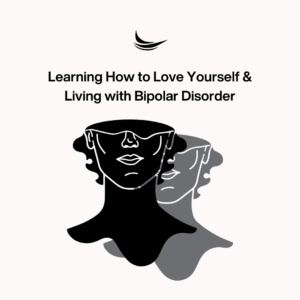Learning How to Love Yourself & Living with Bipolar Disorder
 You are worthy of love and of being loved. You may not feel deserving of love if you have been repeatedly told otherwise. The impact of traumatic experiences, one’s self-talk, ways of coping, mental illness, and access to support are all factors. For those living with bipolar disorder, mood can experience extreme episodic shifts of lows (depressive symptoms) and highs (manic symptoms) that impact self-esteem and ultimately loving yourself.
You are worthy of love and of being loved. You may not feel deserving of love if you have been repeatedly told otherwise. The impact of traumatic experiences, one’s self-talk, ways of coping, mental illness, and access to support are all factors. For those living with bipolar disorder, mood can experience extreme episodic shifts of lows (depressive symptoms) and highs (manic symptoms) that impact self-esteem and ultimately loving yourself.
Did you know that seeking help for your mental health is an act of self-love? While bipolar can significantly impair functioning, many individuals are living with bipolar disorder and thriving! There are effective treatments, including a combination of medication and therapy to help manage symptoms. There are also resources and support designed for the bipolar community.
Mood symptoms during a manic episode are characterized by feeling very elevated or irritable, with overvaluation of self-esteem and importance. There is an excessive interest in pleasurable and risky behaviors such as drinking, spending money, and sexual activity. Whereas in a depressive episode, mood is down, depressed, or hopeless, with little interest or pleasure in activities. The individual often feels bad about themselves, feeling worthlessness or feeling of failure, and may be thinking about death or suicide.
There are different types of bipolar disorder. Bipolar I and Bipolar II both have distinct periods of manic and depressive episodes. Bipolar I disorder is considered more severe as the manic periods are nearly every day for a week and depressive periods last 2+ weeks, with greater impairment on day-to-day activities. Job loss, family conflict, and hospitalizations are examples.
These experiences can create additional stigma and shame. Self-esteem is further impacted by self-deprecation and depressive rumination. Self-sabotage behaviors only add to additional problems and interfere with one’s long-term goals.
If you are struggling with learning how to love yourself while living with bipolar, here are some strategies that can help.
Share Your Story.
Everyone has a story, and each story deserves to be heard. What is your story? What challenges have you overcome? What are you proud about? What are your hopes and dreams?
Harness Your Inner Strengths.
Do you recognize your unique strengths? We all have them. Building on the things you like about yourself can help you embrace a life worth living. If you do not know what these are, your therapist can help you discover some of the attitudes, beliefs, and skills that are strengths.
Permit Yourself to Release Shame.
Shame likes to live in secret and there is power in speaking something out loud to help “release” it. Taking steps such as talking to someone, forgiving yourself, taking responsibility for actions, and making healthy choices moving forward can help.
Seek Support.
Finding a bipolar support group and being connected to resources to help manage mental health symptoms such as a primary care doctor, psychiatrist, and therapist are recommended. A supportive community can validate feelings and normalize experiences, providing a safe space to share struggles and celebrate successes.
Take Care of Yourself.
The importance of having a solid foundation is the first step to taking care of yourself. Daily actions such as tracking moods, taking prescribed medications, establishing routines for daily activities, and prioritizing your health are all forms of loving yourself.
Resources:
Depression and Bipolar Support Alliance
https://www.dbsalliance.org/support/chapters-and-support-groups/
National Alliance on Mental Illness
https://namimn.org/support/support-groups-for-adults-living-with-a-mental-illness/
Written By: Charlotte Johnson, MA, LPCC



























